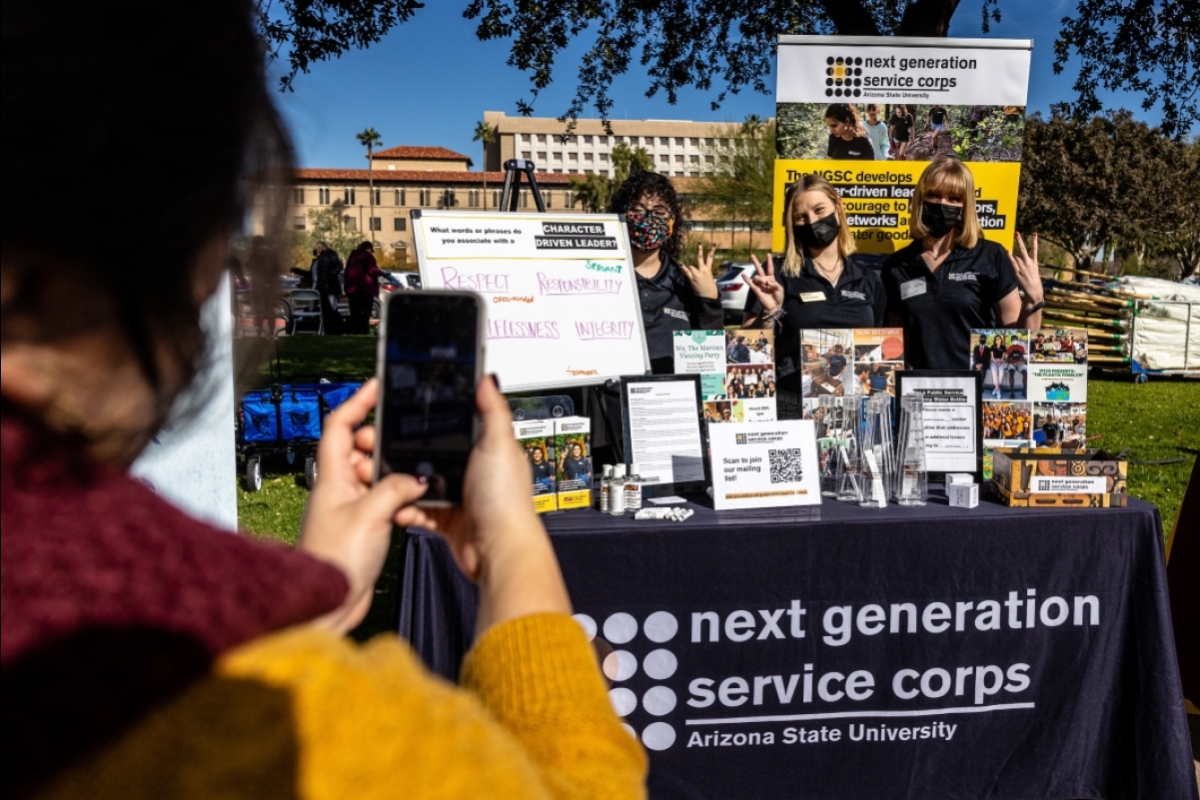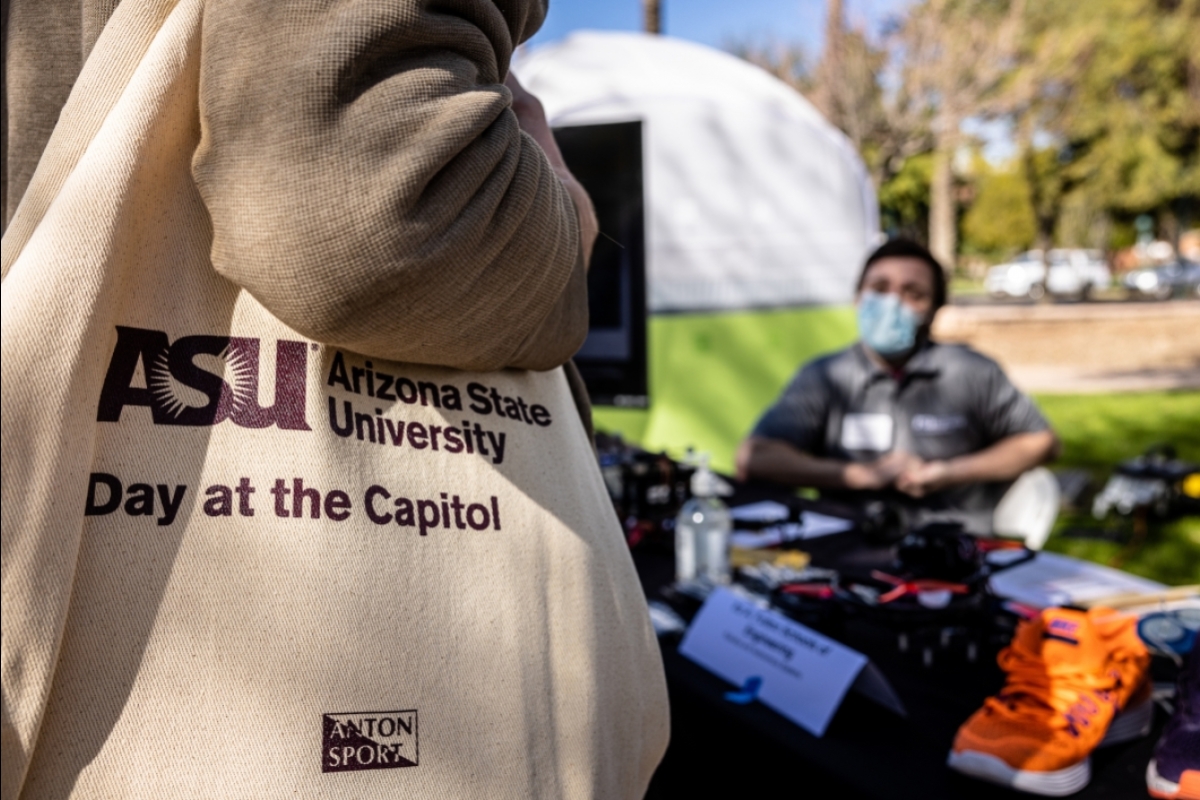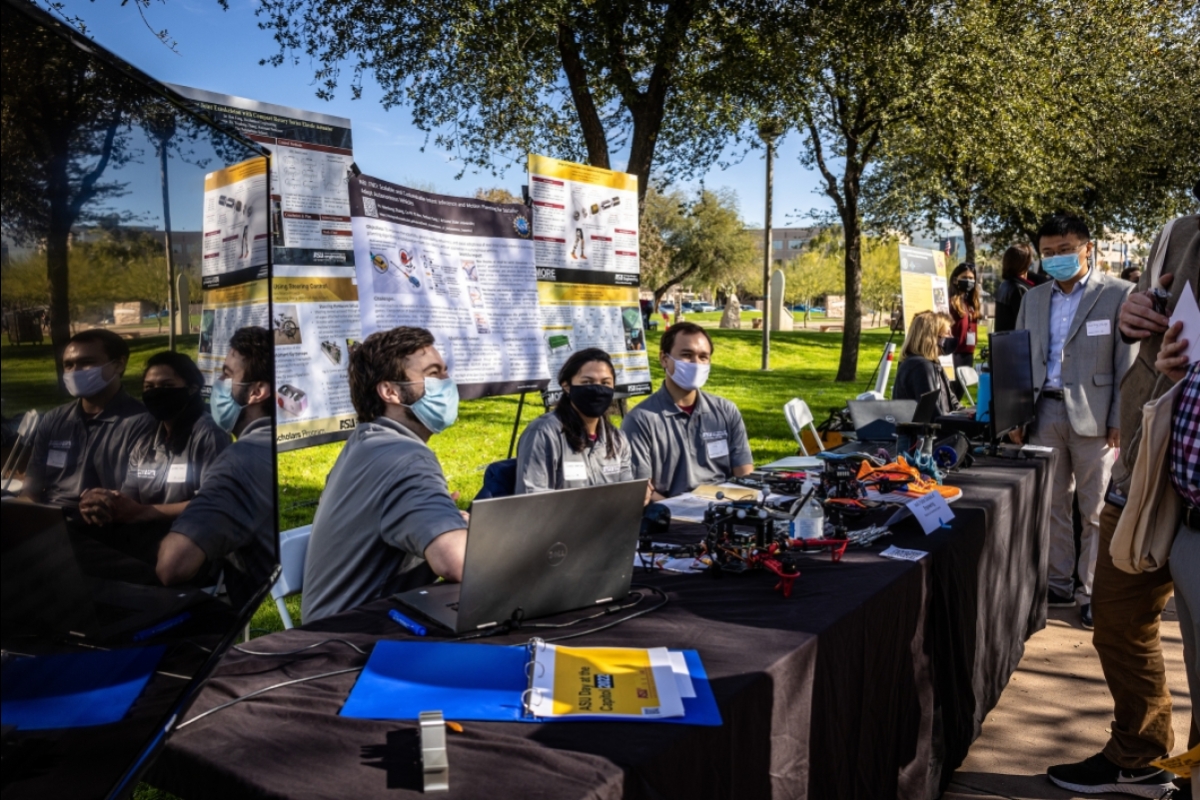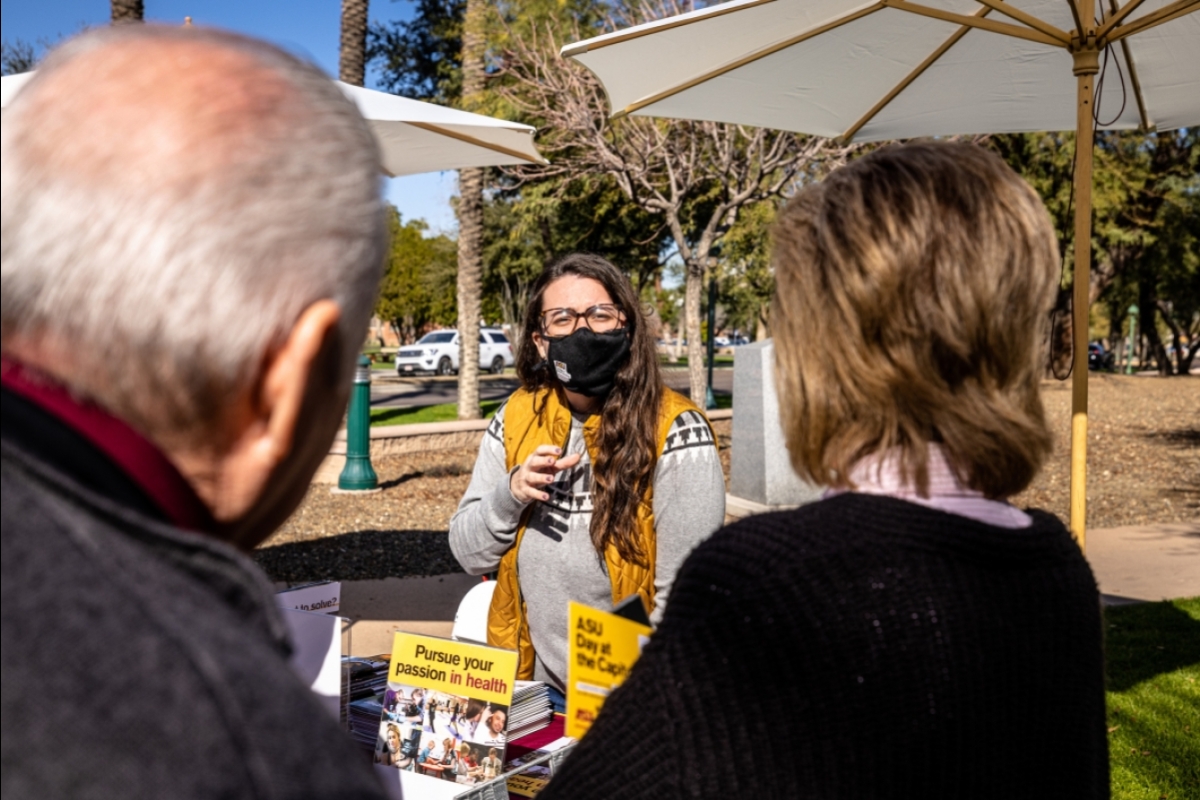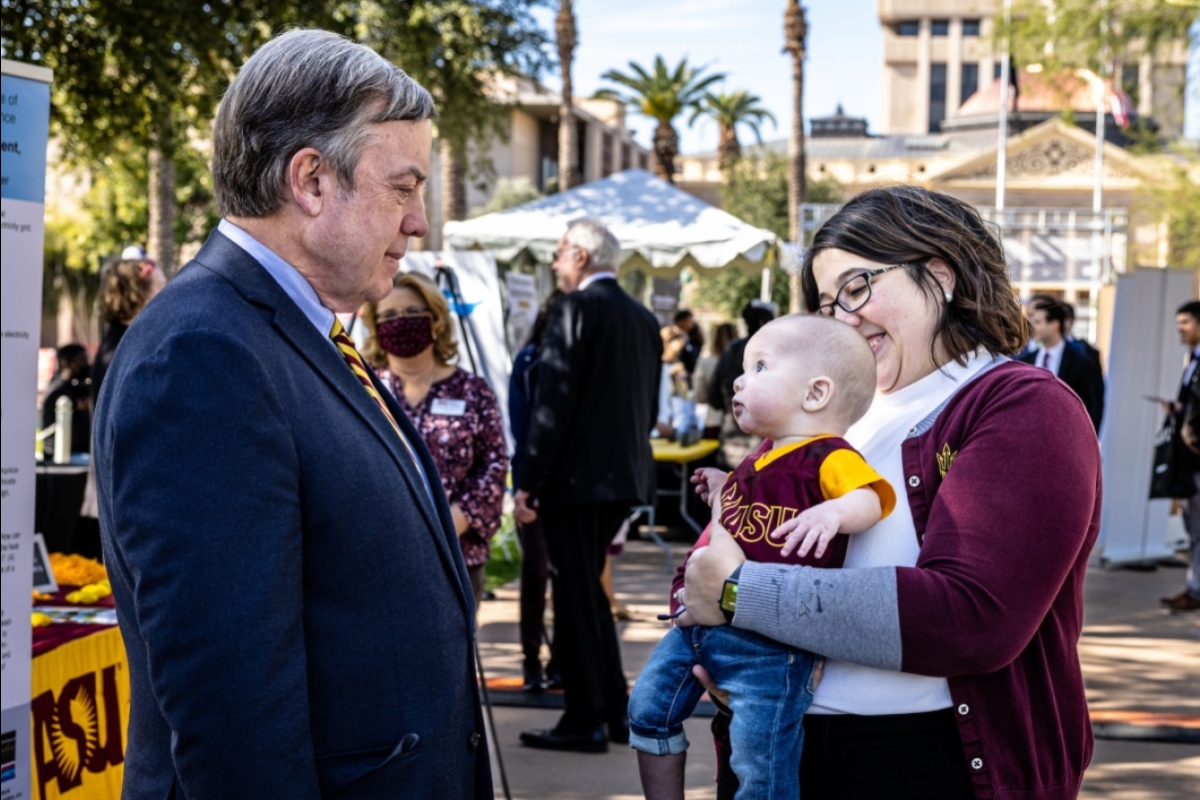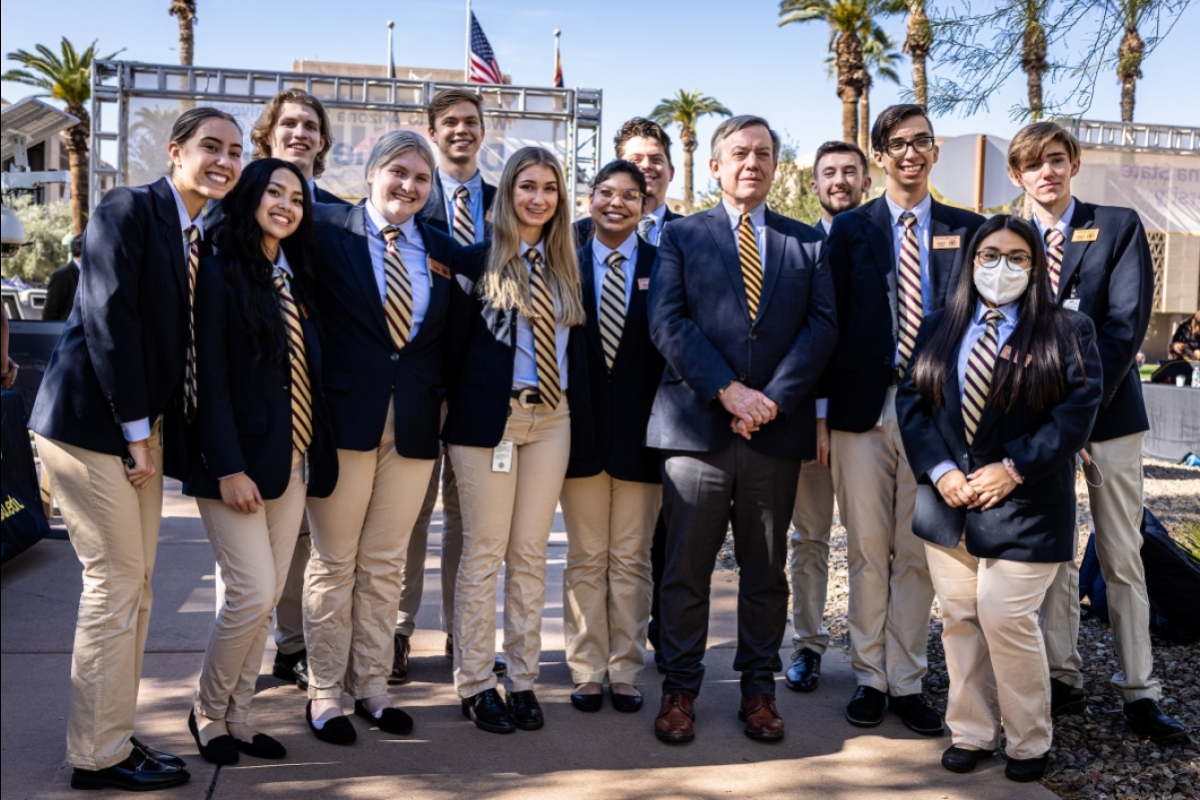ASU's commitment to innovation front and center at Arizona Capitol
Local lawmakers get firsthand glimpse into faculty and student work impacting the future of state and globe

Faculty and student work may start in the classrooms at Arizona State University, but the commitment to innovation reaches far beyond brick and mortar buildings, spanning a variety of multidisciplinary fields.
Advances in medicine and engineering, space exploration, using dog DNA to solve crimes and reviving civic studies in K–12 classrooms were just some of the topics and projects on display during ASU Day at the Capitol on Jan. 25.
The annual event gives local and state lawmakers an up-close glimpse into that innovation. Dozens of academic units, faculty and students from across ASU showcased world-class research and ingenuity in partnerships and projects that will power not only the state’s future, but the global economy and the future of learning.
“As a two-time graduate, first-generation student and current legislator, I am filled with so much pride for everything that Arizona State University does,” said Rep. Marcelino Quiñonez. “It’s been the number one university in innovation for seven years and counting. The NewSpace exploration and this idea of how space works and what’s our relationship with it, I think is incredible,” he said.
Arizona Rep. Marcelino Quiñonez chats with Christine Wilkinson, ASU Alumni Association president and senior vice president and secretary of the university, outside the state Capitol near downtown Phoenix on Tuesday, Jan. 25, as part of ASU Day at the Capitol. Photo by Charlie Leight/ASU News
The School of Earth and Space Exploration and ASU NewSpace were there representing their advances in space exploration. Last year’s Feb. 18 landing of NASA's Perseverance rover on Mars is just one example of ASU’s work in space. The rover — which carries the ASU-led mast-mounted camera system "Mastcam-Z" — will help scientists learn more about water that may have once existed within Mars’ Jezero Crater.
Back down on Earth, another area of exploration beyond borders is within ASU’s School of Transborder Studies, where faculty like Associate Professor Francisco Lara-Valencia study socio-environmental vulnerability, urban health, regional development, binational planning and the role of community networks on sustainable development at the U.S.-Mexico border (specifically along the Arizona-Nogales border) and several other borderlands in South America.
“We need to develop economically and socially, yes of course,” Lara-Valencia said. “But the issue is also environmental, on both sides. Our team is developing a system of indicators with data from both sides of the border that track how much progress has been made in the area in terms of income, poverty, education and accessibility to water,” he said.
The strategic plan Lara-Valencia and his colleagues are developing is bilingual, English and Spanish.
Another partnership among the humanities represented at the event involved the School of Civic and Economic Thought and Leadership and the Center for Political Thought and Leadership. These institutions partner to bring civic debates to campus and civic education back into K–12 classrooms.
“We are partnering with local school districts to emphasize the importance of our democracy and how it runs, as well as teach the basics of both state and federal laws,” said Marlene Rivas, events coordinator at the School of Civic and Economic Thought and Leadership and an alumna of the W. P. Carey School of Business.
To foster even further dialogue, the schools will partner to launch a new podcast called "Rebuilding Arizona Civics" on Feb. 14, the anniversary of Arizona’s founding as a state. Guests will include ASU educators, Arizona teachers and lawmakers, who will discuss how local laws are affecting the education system and how they can improve their classrooms.
“We're excited to continue our mission and be able to bring that civic debate to not only K–12 students, but also our ASU community through our lecture and event series, where we discuss how to handle things like cancel culture and fake news,” Rivas said.
Other colleges and partners represented included the Ira A. Fulton Schools of Engineering, who had several tables with demonstrations, the College of Global Futures, College of Health Solutions, Kyl Center for Water Policy at Morrison Institute, New College of Interdisciplinary Arts and Sciences and the Pat Tillman Veterans Center.
While the new technology of personalized DNA testing results has grown in popularity the last decade, use cases for testing animal and canine DNA can also be useful in solving local crimes, and that’s exactly what Professor Sreetharan Kanthaswamy, from the School of Mathematical and Natural Sciences in the New College, does in his labs, where he teaches genetics and forensic science.
“Instead of getting human DNA, which is more sensitive and more difficult, we can train our students with dog DNA,” Kanthaswamy said. “It is just like 23andMe, but it's using a canine based on 18 genetic markers.”
Kanthaswamy said his students initially worked with nationwide canine samples, mostly from the American Kennel Club, but that working with samples from a local level provides much more relevant information for criminal investigations in the greater Phoenix area and Arizona in general. He also said using animal DNA samples can assist in determining authenticity in food labeling. For example, to determine if a meatball is really beef and not from another animal.
President Michael Crow talks with a policymaker outside the state Capitol near downtown Phoenix on Tuesday, Jan. 25, as part of ASU Day at the Capitol. Photo by Charlie Leight/ASU News
One of the biggest challenges humans face around the globe, but especially in desert climates like Arizona, is water. Rights, use and general resources are what policy analysts and researchers like Susan Craig and Sarah Porter do at ASU's Kyl Center for Water Policy at Morrison Institute.
The team at the Kyl Center created the Arizona Water Blueprint. It is an interactive, data-driven map of Arizona’s water resources and infrastructure.
“We developed this tool so that we can have better discussions, so that we have better solutions,” said Craig, a water policy analyst at the center.
The map and website provide a tool for holistic thinking to inform policy decisions and good water stewardship.
“When you have the opportunity to walk around and talk with students and faculty, you really see how ASU never stops thinking about how the world can be better,” Rep. Quiñonez said.
Top image: Doctoral student Alan Ehret of the STAM Center (Secure, Trusted, and Assured Microelectronics) talks about the small supercomputer, with 40 dual-core processor boards networked together, outside the state Capitol near downtown Phoenix on Tuesday, Jan. 25, as part of the ASU Day at the Capitol. Photo by Charlie Leight/ASU News
More Science and technology

ASU author puts the fun in preparing for the apocalypse
The idea of an apocalypse was once only the stuff of science fiction — like in “Dawn of the Dead” or “I Am Legend.” However these days, amid escalating global conflicts and the prospect of a nuclear…

Meet student researchers solving real-world challenges
Developing sustainable solar energy solutions, deploying fungi to support soils affected by wildfire, making space education more accessible and using machine learning for semiconductor material…

Miss Arizona, computer science major wants to inspire children to combine code and creativity
Editor’s note: This story is part of a series of profiles of notable spring 2024 graduates. “It’s bittersweet.” That’s how Tiffany Ticlo describes reaching this milestone. In May, she will graduate…

